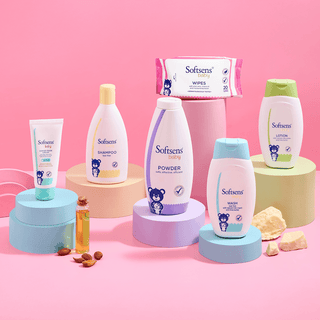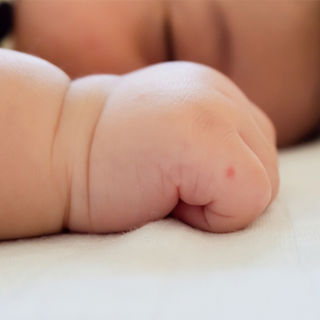
For a parent, watching your baby’s first teeth come in can be quite exciting, and you’ll proudly point out those tiny teeth to everyone like it’s the most magical thing you’ve seen. Teething is an important developmental milestone for your little ones, so gear up as we learn more about this fascinating process.
To help you know what to expect, we’ve put together a guide with your baby’s teething timeline, care tips and more.
When do babies get their first teeth?
On average, most babies start getting their first teeth at around 6-7 months of age. However, this varies quite a bit and some might even get their first teeth as early as 3-4 months or as late as 12 months.
You might notice the signs of teething a while before your baby’s first tooth actually erupts. As the tooth erupts from under the gums, many babies experience pain and discomfort and you might notice that baby is extra fussy, is drooling excessively or has red swollen gums. Click here to read more on common baby teething symptoms and how to soothe & comfort teething babies.
Your Baby’s Teething Timeline
For most babies, the first teeth to erupt are usually the bottom front or the top front teeth. These are called the lower and upper central incisors. These are often followed by the molars and then canines.
In total, your baby will have 20 teeth by the time they are 2.5-3 years old. These are called your baby’s primary, deciduous or simply baby teeth! Your baby’s primary teeth will remain until your child is around 6-7 years of age, after which they will start falling out and be replaced by your baby’s permanent teeth.
Here’s an approximate timeline of when your baby’s first teeth will typically begin to come in.

How to care for baby’s teeth?
Keep those sweet baby teeth clean & healthy by following a few basic steps.
-
Brush your baby’s teeth daily: As soon as baby’s first tooth comes in, start brushing baby’s teeth twice a day with an infant toothbrush and a tiny dot of fluoride toothpaste. Be gentle and try and make this a fun activity for baby.
-
Stay away from sugary foods & juices: Avoid sugar-filled foods and juices - these are often the main cause of cavities.
- Clean baby’s gums after a feeding: Use a clean damp cloth to gently clean baby’s gums after you feed them
- Take baby to the dentist: Schedule a dental appointment once your baby’s first tooth comes in. Regular dental checkups are key to good oral health for you and your family.
-
Be careful of ‘bottle rot’
Bottle rot is basically tooth decay that takes place when baby drinks often from a bottle, or goes to sleep with a bottle, which could be filled with formula, milk, juice and sugary drinks. Prevent this from happening by avoiding sugary drinks. Don’t put baby to bed with a bottle of breast milk or formula, as the sugars can react with the natural bacterial in the mouth to cause decay. Clean baby’s gums and teeth before they sleep.
We hope that covered most of your baby teething questions! Remember that every baby meets developmental milestones at a different pace and the same goes for their teething schedule too. Oh, and don’t forget to take lots of pictures of those sweet teethy grins!



















